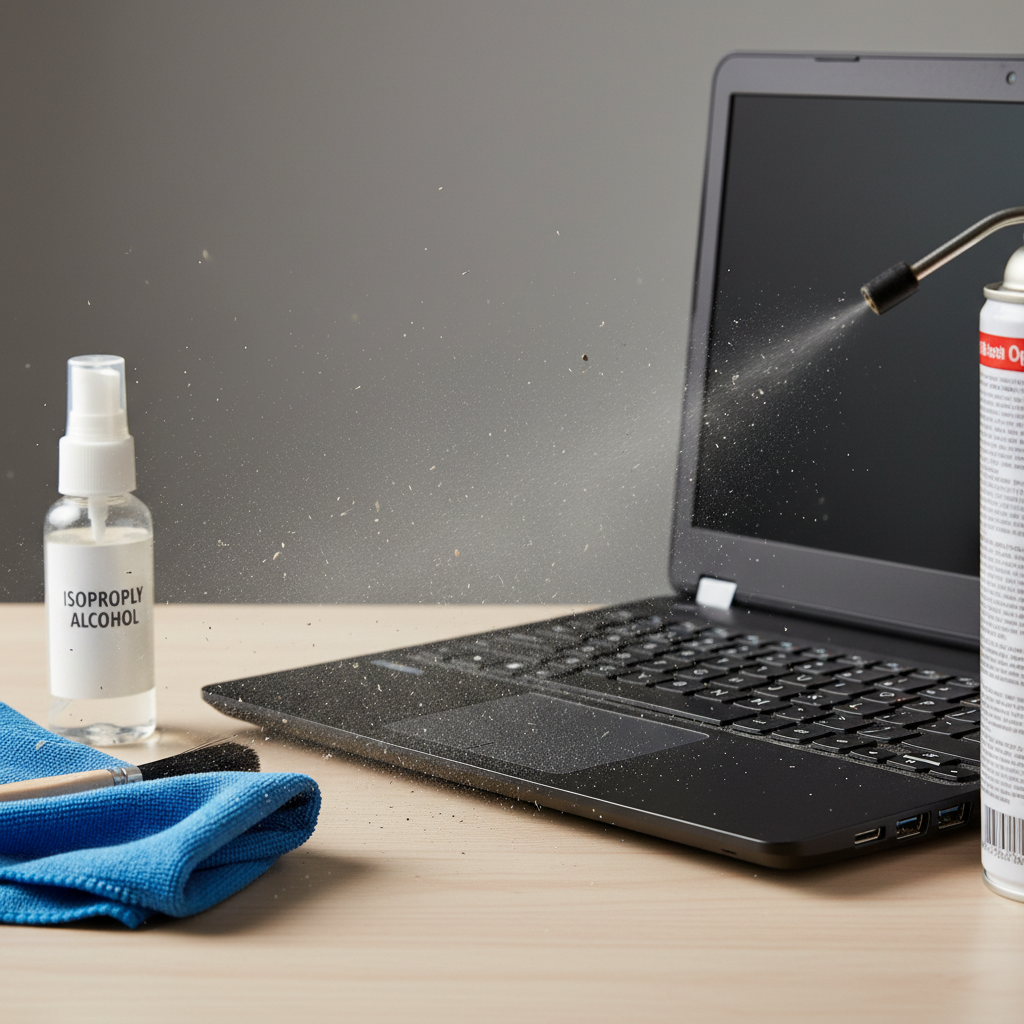
Table of Contents
Introduction
When’s the last time you actually looked at your laptop keyboard? Really looked at it. Those keys you tap hundreds (maybe thousands) of times each day are probably harboring more dust, crumbs, and mystery grime than you’d care to admit. And here’s the thing—all that buildup isn’t just gross. It’s quietly messing with your typing experience and potentially shortening your laptop’s lifespan.
Your laptop goes everywhere with you, right? Coffee shops, kitchen tables, that slightly questionable desk in your bedroom. Each location brings new opportunities for stuff to find its way under your keys. Crumbs from yesterday’s lunch. Oils from your fingertips. Dust that seems to appear from nowhere. Before you know it, your once-responsive keyboard starts feeling sticky and unresponsive. The good news? Learning to clean it properly can save you from frustrating typing sessions and expensive repair bills. Speaking of maintenance, if you’re dealing with charging issues too, check out how to clean charging ports—because a clean laptop is a happy laptop.
Now, I get it. The thought of cleaning your keyboard might make you nervous. What if you pop off a key and can’t get it back on? What if you accidentally fry something with moisture? These are totally valid concerns, and honestly, they’re exactly why most people just… don’t clean their keyboards. But with the right approach and tools, you can safely get your keyboard looking and feeling like new again. And while you’re thinking about laptop improvements, you might want to explore how to upgrade laptop RAM for an overall performance boost that pairs perfectly with a clean, well-maintained machine.
Keeping your keyboard clean fits into a bigger picture of device care. Your screen deserves attention too—nothing beats the clarity of a properly cleaned display, which you can master with tips from how to clean tablet screens. And if you’re setting up a clean, organized workspace, you’ll probably want to know how to connect Bluetooth speakers or get the most out of wireless earbuds. Because let’s face it—when all your tech is clean and working smoothly, everything just feels better.
What You’ll Learn in This Guide
This guide breaks down everything you need to know about safely cleaning your laptop keyboard. Whether you’re dealing with light dust or serious gunk buildup, we’ve got you covered with practical, step-by-step advice that won’t put your laptop at risk.
- Why Proper Cleaning Matters: You’ll discover how regular cleaning fights germs, prevents hardware damage, and keeps your typing smooth and comfortable. Plus, we’ll cover what happens when you skip this simple maintenance task.
- Getting Ready to Clean: Learn the essential prep steps like safely powering down your laptop and gathering the right supplies—think microfiber cloths and isopropyl alcohol—that clean effectively without causing damage.
- Actual Cleaning Methods: Get clear, foolproof instructions for different approaches, from using compressed air for basic debris removal to gentle surface cleaning with alcohol, plus safe key removal for those stubborn problem areas.
- Keeping It Clean: Pick up simple daily habits that prevent buildup in the first place, like washing your hands before typing, covering your keyboard when it’s not in use, and doing quick maintenance cleans that save you time later.
By the time we’re done here, you’ll understand exactly how to tackle each step of the cleaning process without fear. If you’ve ever dealt with keys that stick or feel mushy when you type, this guide will give you the confidence to fix those issues yourself instead of heading straight to the repair shop. And cleaning isn’t the only way to keep your laptop running smoothly—understanding how to fix a slow computer can complement your cleaning routine by addressing performance issues that might be slowing you down.
Of course, sometimes the best maintenance is prevention. If you’re in the market for an upgrade, checking out the best laptops with SSD drives could give you faster performance and more reliable storage. It’s interesting how technology keeps evolving across different sectors too—like the innovations we’re seeing in technology in financial services. Staying on top of tech maintenance helps you make the most of these advances, whether for work or personal use.
Here’s the bottom line: your devices are part of your daily life, and keeping them clean isn’t just about looking professional—it’s about protecting your investment and enjoying a better user experience. This guide will take you from “I should probably clean that someday” to actually knowing how to do it safely and effectively. Ready to give your keyboard the attention it deserves? Let’s get started.

Let’s be honest—when was the last time you actually looked at your laptop keyboard? I mean really looked at it. If you’re like most people, you probably don’t want to think about what’s lurking between those keys. But here’s the thing: keeping your keyboard clean isn’t just about making it look nice (though that’s a bonus). It’s about protecting your health and making sure your laptop actually works the way it should.
Think about it. Your keyboard gets more action than almost any other part of your laptop. Every email, every late-night Netflix binge, every work project—your fingers are constantly dancing across those keys. And with all that contact comes dust, crumbs, oils from your skin, and yes, germs. Lots of them.
Understanding the Importance of Proper Keyboard Cleaning
Your laptop keyboard is basically a germ magnet. Seriously—studies have shown that keyboards can harbor more bacteria than toilet seats. (I know, gross, right?) But beyond the ick factor, all that accumulated gunk can actually mess with your laptop’s performance.
Ever had a key that sticks or doesn’t respond when you press it? That’s probably debris doing its dirty work. And if you’ve ever spilled something on your keyboard—even just a few drops of coffee—you know how quickly things can go from bad to worse if you don’t clean it up properly.
Here’s what regular cleaning actually does for you: it keeps your keys responsive, prevents those frustrating moments when “e” decides to take a break mid-sentence, and helps your laptop last longer overall. It’s similar to the gentle approach we talk about in how to clean charging ports—you want to be thorough but careful with these sensitive electronics.
Key Aspects of Keyboard Cleaning Importance
Here’s why you should actually care about keeping your keyboard clean:
- Preventing Germ and Bacteria Spread: Your keyboard is like a petri dish for whatever your hands have touched throughout the day. Regular cleaning cuts down on the nasty stuff that can make you sick.
- Maintaining Optimal Functionality: When dust bunnies move in under your keys, they don’t pay rent—they just cause problems. Clean keys press smoothly and respond exactly when they should.
- Extending Device Lifespan: A little TLC goes a long way. Keeping moisture and grime away from your keyboard’s internals means your laptop will keep working for years to come.
- Improving User Experience: There’s something satisfying about typing on a clean keyboard. Your fingers glide better, and you don’t have to deal with that annoying sticky feeling.
Once you understand why cleaning matters, you’ll be more motivated to actually do it. And trust me, it’s easier than you think.
Safe and Effective Methods for Cleaning Laptop Keyboards
Now for the good stuff—how to actually clean your keyboard without turning your laptop into an expensive paperweight. First rule: always shut down your laptop before you start. You don’t want to accidentally send a gibberish email to your boss while you’re scrubbing away.
The key (pun intended) is using the right tools and being gentle. You’re not pressure-washing a deck here—you’re handling delicate electronics. Microfiber cloths and isopropyl alcohol are your best friends. And compressed air? That’s your secret weapon for getting into all those tiny spaces without risking water damage.
If you want to see these same careful principles applied to other parts of your devices, check out how to clean tablet screens. The gentle approach works across all your tech.
Key Cleaning Techniques to Utilize
Here are the methods that actually work (and won’t destroy your laptop in the process):
- Using Compressed Air: This is your first line of defense. A few quick bursts between the keys will blow out most of the loose stuff. It’s perfect for daily maintenance and won’t introduce any moisture to worry about.
- Surface Cleaning with Cloth and Alcohol: Dampen (don’t soak!) a microfiber cloth with isopropyl alcohol and gently wipe down the keys. This gets rid of oils and sticky spots without drowning your electronics.
- Deep Cleaning for Stubborn Dirt: Sometimes you need to go nuclear. If your laptop allows it, you can carefully pop off individual keys and clean underneath. Just be super careful and maybe Google your laptop model first to see if this is even possible.
- Regular Light Cleaning: The best cleaning routine is the one you actually stick to. A quick daily wipe-down prevents major buildup and keeps you from needing those scary deep-cleaning sessions.
The bottom line? A clean keyboard is a happy keyboard. And a happy keyboard means a happier you. Start with these gentle methods, be consistent, and your laptop will thank you with years of reliable service. Plus, you won’t have to worry about what your friends might think when they see your keyboard up close.

Here’s the bottom line: keeping your laptop keyboard clean isn’t just about making it look nice—it’s about protecting your health and keeping your device running smoothly. Think about it—how many hours a day do your fingers spend on those keys? All that contact means germs, crumbs, and who knows what else building up over time. And when keys start sticking or stop responding? That’s your productivity taking a hit.
We’ve covered everything from the quick daily fixes (compressed air is your friend) to the deeper cleaning sessions when things get really grimy. The key takeaway? A little preparation goes a long way. Power down first, grab the right supplies, and take your time. Your keyboard—and your wallet—will thank you when you avoid those expensive repair bills down the road.
But let’s be real: your keyboard is just one piece of the puzzle. A clean, well-maintained laptop makes everything better. Whether you’re cranking out work projects or binge-watching your favorite shows, a responsive device just makes life easier. And in a world where we’re practically attached to our laptops? That matters more than ever.
Ready to take your laptop maintenance to the next level? Don’t stop at the keyboard. Learn how to clean charging ports—because nothing’s worse than a laptop that won’t charge when you need it most. Want more speed? Check out our guide on how to upgrade laptop RAM for a serious performance boost. Got a tablet too? Our tablet screen cleaning guide will keep that display crystal clear. And if your computer’s been acting sluggish lately, our tips on how to fix a slow computer can help you get back up to speed.
Look, regular keyboard cleaning might seem like a small thing, but it adds up. Cleaner keys mean fewer sick days, better typing experiences, and a laptop that lasts longer. Whether you’re a casual user or your laptop is your lifeline for work, these simple habits make a real difference. So grab that microfiber cloth, make it part of your routine, and enjoy the satisfaction of a keyboard that actually feels good to use. Trust me—once you experience the difference a clean keyboard makes, you’ll never go back to the grimy days.
Frequently Asked Questions
-
Can I use water to clean my laptop keyboard?
- Minimal water can be used on a cloth, but never pour directly onto the keyboard to avoid damage.
-
How often should I clean my laptop keyboard?
- Light cleaning weekly and deep cleaning every few months is recommended.
-
Is it safe to remove keys for cleaning?
- Only remove keys if you know your laptop allows it; otherwise, professional cleaning is safer.
-
What household items can I use for cleaning?
- Microfiber cloths, isopropyl alcohol, and compressed air are safe options.
-
Why is my keyboard sticky after cleaning?
- Residue from cleaning products or moisture can cause stickiness; wipe dry and use proper products.


